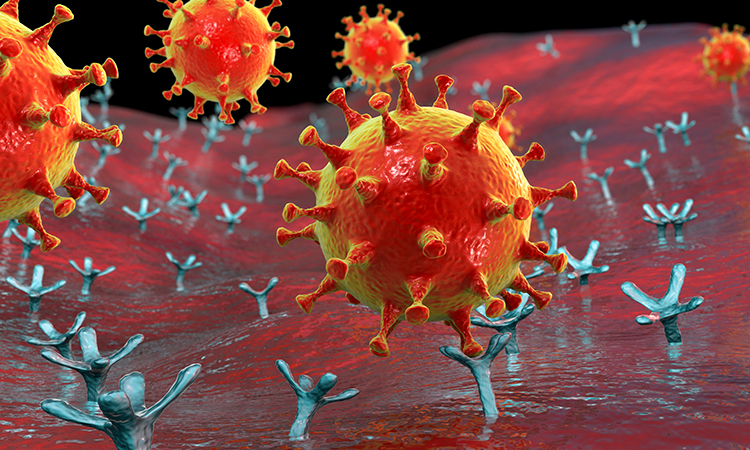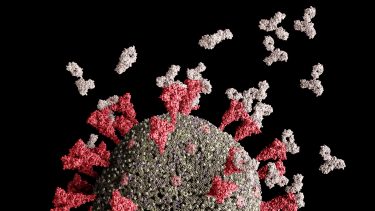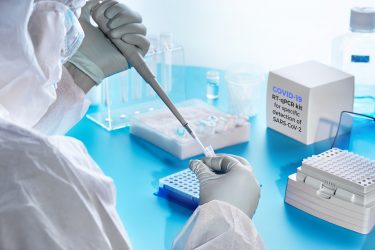Developing a broadly neutralising antibody therapeutic to combat SARS-CoV-2
Posted: 31 March 2021 | Dr Laura Walker (Adagio Therapeutics) | No comments yet
With the ongoing COVID-19 pandemic, new treatments continue to be urgently needed. One potential solution is antibody therapeutics, which can be used to neutralise the coronavirus and provide future immunity to patients. Here, Dr Laura Walker from Adagio Therapeutics discusses how antibodies can be used in the fight against Severe Acute Respiratory Syndrome coronavirus 2 (SARS-CoV-2) and how a lead antibody candidate has been selected.


What benefits can antibody therapeutics offer against SARS-CoV-2?
Antibodies can offer effective treatment and durable protection against SARS-CoV-2, helping to reduce the chance of hospitalisation for infected individuals and prevent the disease entirely in a similar fashion to vaccines; antibodies are essentially passive vaccines.


While COVID-19 vaccines require an intact immune system to generate antibodies that provide protective immunity, monoclonal antibodies (mAbs) are delivered directly and do not involve the immune system, providing protection regardless of age and immune function.
However, all antibodies are different and offer varying levels of protection, both in terms of their ability to neutralise SARS-CoV-2 but also when fighting against emerging variants of the novel coronavirus. Our lead antibody candidate, ADG20, was designed to provide potent neutralisation and protection against known variants of SARS-CoV-2 as well as other known coronavirus threats that may emerge in the future.
How did you discover your antibody candidate, ADG2?
ADG2 is the precursor of ADG20; the latter is the half-life engineered version of the former and we believe it will provide protection against COVID-19 for up to a year.
The current crisis of emerging variants was very much in mind when we set out to discover ADG20. An escape mutation would present a significant issue so we wanted to develop an antibody that could protect against all variants and future SARS‑like coronaviruses. We believe we achieved this by targeting a highly-conserved epitope of the SARS-CoV-2 Spike (S) protein, which no other antibodies are targeting, making it potentially effective against future emerging strains.
The current crisis of emerging variants was very much in mind when we set out to discover ADG20”
We discovered the molecule by sorting B cells from a SARS-CoV survivor to discover S protein-binding antibodies and then tested a number of these antibodies to determine their potency against both SARS-CoV and SARS-CoV-2. Next, we selected the broadest neutralising antibody and engineered it to maximise its potency and duration of effect. One crucial step was ensuring it is highly manufacturable. ADG2 has demonstrated favourable biophysical properties in a series of in vitro assays that have been shown to be predictive of downstream behaviours, such as serum half-life, ease of manufacturing, ability to formulate to high concentrations and long-term stability.
What tests did you undertake to test the efficacy of this antibody? What did these results show?
The antibody was tested for neutralising activity against multiple SARS-related coronaviruses, which demonstrated that it potently neutralised all of the viruses we tested. We also showed that the mAb protects against both SARS-CoV and SARS‑CoV-2 challenge in a mouse model. Unpublished follow‑up studies (from data generated by researchers at Oxford University, UK) also proved that the antibody potently protects in hamster and non-human primate models and potently neutralises the B.1.1.7, B.1.351 and P.1 variants.
What were your most promising findings from these studies?
We have produced data that show ADG20 potently binds to and neutralises all known SARS-CoV-2 variants and is likely to protect against variants we have not even discovered yet.


Did you face any challenges during this research?
At the outset, we saw many companies trying to move as quickly as possible to bring forward candidates and we knew from the pace of progress early on that there would be other treatments advancing rapidly. We stepped back and thought about how this disease was likely to play out over time and that motivated us to take a more methodical approach to finding the right antibodies that would provide the combination of broad and potent neutralisation that is exhibited by ADG20 and our other antibodies. It meant we were not going to be first, but that was never our goal – we were solving a different, broader problem.
What is the importance of ensuring that antibodies can neutralise variants of SARS-CoV-2?
Given the number of infections globally and the rates at which variants are appearing, it is likely that SARS-CoV-2 will become endemic and continue to circulate with new variants emerging continually. It is also possible that the virus will spill over into animal reservoirs, diversify to adapt to new host species and then move back over into human populations, as exemplified by the mink infections in Denmark. It is critical that we do everything possible to get ahead of emerging and potential new variants to minimise the threat.
Antibodies can offer effective treatment and durable protection against SARS-CoV-2”
That is why we engineered ADG20 to target all variants as well as future coronaviruses, so that we are prepared in the face of future SARS‑like coronaviruses. We are also exploring how our antibody discovery efforts could inform pan‑coronavirus vaccine development.
What are the next steps for the development of ADG20?
We recently announced that ADG20 has entered into the clinic for the treatment and prevention of COVID-19. We are evaluating its safety, tolerability and pharmacokinetics including serum SARS‑CoV-2 neutralisation antibody levels in healthy participants. We are also evaluating the efficacy of ADG20 against known variants. The company expects initial Phase I data in Q2 and Phase II data by the year’s end.
The US Food and Drug Administration (FDA) recently signalled flexibility in the development of vaccines and antibodies that address variants that could expedite how quickly it approves antibodies that address these emerging resistant variants.
Dr Laura Walker is the Director of Antibody Science at Adimab and Chief Scientific Officer and Co-founder of Adagio Therapeutics. She is an expert in B-cell immunology and infectious disease with over 10 years of experience studying antibody responses to numerous viral pathogens. She received her BS in Biochemistry from the University of Wisconsin-Madison, her PhD in Immunology and Microbiology from The Scripps Research Institute and was a post-doctoral research fellow in Immunology at The University of California, San Francisco. Over the past decade, Laura has researched the generation of broad and highly-potent neutralising antibodies to a variety of viral pathogens, including Ebola, RSV, Zika, yellow fever and SARS-CoV-2, publishing over 30 peer-reviewed papers on antiviral antibodies.
Reference
- Rappazzo C, Tse L, Kaku C, Wrapp D, Sakharkar M, Huang D, et al. Broad and potent activity against SARS-like viruses by an engineered human monoclonal antibody. Science. 2021;371(6531):823-829.
Related topics
Antibodies, Antibody Discovery, Assays, Biopharmaceuticals, Drug Leads, In Vitro, In Vivo, Proteomics
Related conditions
Covid-19
Related organisations
Agilent, US Food and Drug Administration (FDA)


